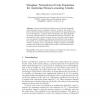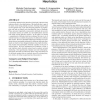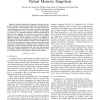9 search results - page 1 / 2 » Network-Level Polymorphic Shellcode Detection Using Emulatio... |
118
click to vote
DIMVA
2006
15 years 3 months ago
2006
Abstract. As state-of-the-art attack detection technology becomes more prevalent, attackers are likely to evolve, employing techniques such as polymorphism and metamorphism to evad...
112
click to vote
DIMVA
2009
15 years 3 months ago
2009
Remote code-injection attacks are one of the most frequently used attacking vectors in computer security. To detect and analyze injected code (often called shellcode), some researc...
109
click to vote
RAID
2007
Springer
15 years 8 months ago
2007
Springer
Network-level emulation has recently been proposed as a method for the accurate detection of previously unknown polymorphic code injection attacks. In this paper, we extend network...
110
click to vote
ACSAC
2010
IEEE
15 years 3 days ago
2010
IEEE
A promising method for the detection of previously unknown code injection attacks is the identification of the shellcode that is part of the attack vector using payload execution....
119
click to vote
INFOCOM
2010
IEEE
15 years 16 days ago
2010
IEEE
Abstract—Malicious shellcodes are segments of binary code disguised as normal input data. Such shellcodes can be injected into a target process’s virtual memory. They overwrite...



